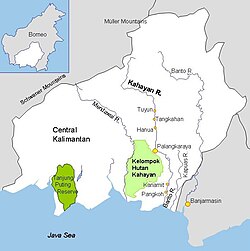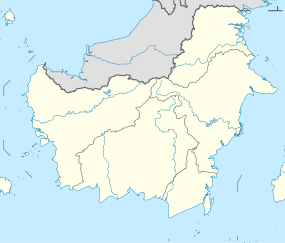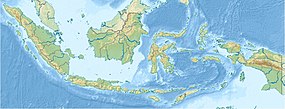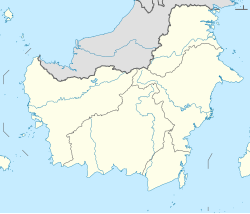Barito River
| Barito River Sungai Barito, Sungai Dusun, Soengai Doesoen, River Banjer, Sungi Dunsun, Soengai Baritoe, Barito-rivier, Sungai Banjar, Sungai Banjarmasin, Sungai Banjar Besar | |
|---|---|
 Barito and other rivers in Central and South Kalimantan | |
| Location | |
| Country | Indonesia |
| Physical characteristics | |
| Source | |
| • location | Muller Mountain Range |
| Mouth | |
• location | Java Sea |
• elevation | 0 m (0 ft) |
| Length | 890 km (550 mi) |
| Basin size | 100,000 km2 (39,000 sq mi) |
| Discharge | |
| • average | 5,500 m3/s |
| Basin features | |
| Tributaries | |
| • left | Banjar Kecil River; Negara River; Kuin River; Kuin Kecil River; Alalak River |
| • right | Murung River; Anjir Tamban; Anjir Serapat[1] |

Barito River is a 890-kilometre-long (550 mi) river with a drainage basin of 100,000 square kilometres (39,000 sq mi) in South Kalimantan, Indonesia, about 900 km northeast of the capital Jakarta.[2] The average discharge of the river is 194,230 cubic feet per second (5,500 m3/s).[3] It originates in the Muller Mountain Range, from where it flows southward into the Java Sea. Its main affluent is the Martapura River, and it passes through the city of Banjarmasin.[4][5][6]
This river is the location of the closest relative of the Malagasy language of Madagascar, the Ma'anyan language of Dayaks, from where settlers arrived in Madagascar (presumably in waves) from the 3rd to 10th century and from which the current island nation's population largely traces its origins.
Geography
The river flows in the southeast area of Borneo with predominantly tropical rainforest climate (designated as Af in the Köppen-Geiger climate classification).[7] The annual average temperature in the area is 24 °C. The warmest month is October, when the average temperature is around 26 °C, and the coldest is January, at 20 °C.[8] The average annual rainfall is 2735 mm. The wettest month is December, with an average of 437 mm rainfall, and the driest is September, with 62 mm rainfall.[9]
Images
-
Dutch boat on the Barito River (1917)
-
Inhabitants along the Barito
-
A boat on the Barito
See also
References
- ^ "Archived copy". Archived from the original on 2017-05-16. Retrieved 2019-01-08.
{{cite web}}: CS1 maint: archived copy as title (link) - ^ Sungai Barito at Geonames.org (cc-by); Last updated 2013-06-04; Database dump downloaded 2015-11-27
- ^ Roth; Henry Ling Roth; Hugh Brooke Low (1896). The Natives of Sarawak and British North Borneo. Truslove & Hanson. p. clxi.
Barito River.
Original from Harvard University - ^ van Hoëvell, Wolter Robert (1838). Tijdschrift voor Nederlandsch Indië (in Dutch). Vol. 1. Ter Lands-drukkerij. p. 6.
- ^ Buddingh, Steven Adriaan (1861). Neêrlands-Oost-Indië: Reizen over Java, Madura, Makasser, Saleijer, Bima, Menado, Sangier-eilanden, Talau-eilanden, Ternate, Batjan, Gilolo en omliggende eilanden, Banda-eilanden, Amboina, Haroekoe, Saparoea, Noussalaut, Zuidkust van Ceram, Boeroe, Boano, Banka, Palembang, Riouw, Benkoelen, Sumatra's West-Kust, Floris, Timor, Rotty, Borneo's West-Kust, en Borneo's Zuid- en Oost-Kust; gedaan gedurende het tijdvak van 1852-1857 (in Dutch). M. Wijt. pp. 442.
de groote Banjersche rivier (de Barito).
- ^ Nederlandsch-Indië (1838). "Tijdschrift voor Nederlandsch-Indië" (in Dutch). 1–2. Lands-drukk.: 6.
{{cite journal}}: Cite journal requires|journal=(help) - ^ Peel, M C; Finlayson, B L; McMahon, T A (2007). "Updated world map of the Köppen-Geiger climate classification". Hydrology and Earth System Sciences. 11: 1633–1644. doi:10.5194/hess-11-1633-2007. Retrieved 30 January 2016.
{{cite journal}}: Cite has empty unknown parameter:|1=(help) - ^ "NASA Earth Observations Data Set Index". NASA. 30 January 2016.
- ^ "NASA Earth Observations: Rainfall (1 month - TRMM)". NASA/Tropical Rainfall Monitoring Mission. 30 January 2016.
External links
 Media related to Barito River at Wikimedia Commons
Media related to Barito River at Wikimedia Commons






